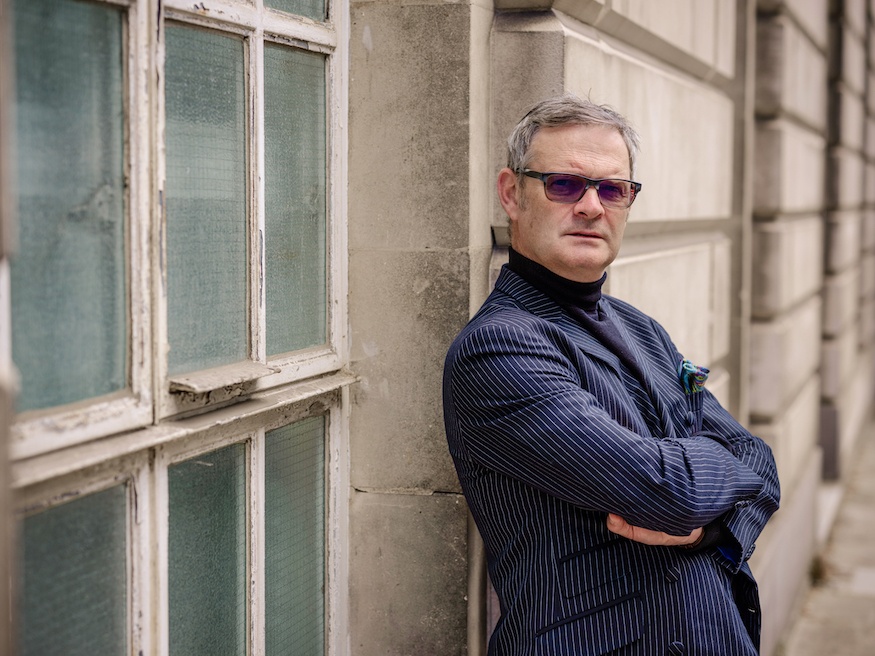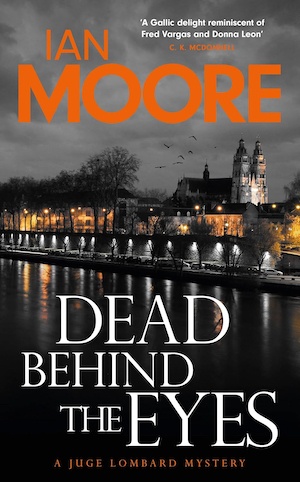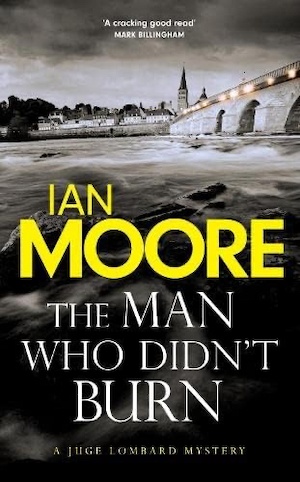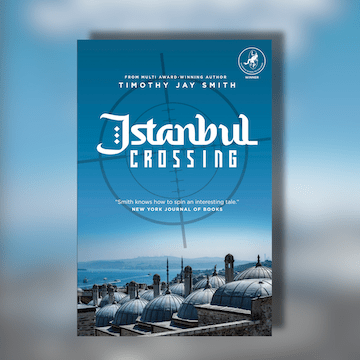
On the stage, Ian Moore is a standup comedian with a witty repertoire of humorous commentary that pokes fun at all areas of life. After moving to the Loire Valley in France, he eventually naturalised as a French citizen and, spending more time away from the stage, decided to write a crime novel. His first was Death and Croissants in 2021, which began a series of four cosy crime novels set in the Follet Valley. These were followed by The Man Who Didn’t Burn in 2023, a police procedural with a more serious edge, which introduced Juge Lombard. This week, The Man Who Didn’t Burn is arriving as a paperback and Ian’s new Juge Lombard mystery, Dead Behind the Eyes, is set for release on 7 November. We decided to invite him to join us on the Crime Fiction Lover virtual sofa to find out more Lombard and what it’s like for an Englishman to write French policiers.
What took you from comedy into crime stories and how you became a crime fiction author?
It never really felt like a big step. My downtime as a comedian on the road was always spent watching or reading crime, Morse and Poirots and Marples and so on, comfort viewing really designed to slow the pulse. Anything that I could get lost in for a bit that would take my mind off that evening’s show. They were a perfect distraction because trying to second guess a crimewriter was more fun than planning for a late night comedy audience.
In order to cut down on travelling and to get myself properly into the French social security system, I opened a B&B at our house. It didn’t take me long to realise that 25 years as a stage comedian didn’t prepare me in any way for hospitality, therefore rather than actually murder my guests, I fantasised about fictionally murdering my guests. That’s when my first crime novel, Death and Croissants, was born.

And what are crime fiction lovers going to love about Dead Behind the Eyes?
I think Dead Behind the Eyes is different from other mysteries or police procedurals out there, because the French system of policing is so different from our own experience in the UK. When I first learned about the investigating magistrate role in French policing, I knew it was ripe for fan fiction devotees. It’s more akin to the US district attorney role, but in short, the investigating magistrate is appointed by the state to oversee the police investigation of major crimes. They are independent and only there to seek the truth. Now usually these legal fonts of knowledge with powers to tap phones, access bank accounts, extend arrest times et cetera stay behind their desks and just issue diktats to the police. Lombard is hands on, at the crime scene, with the police as often as possible. This causes friction obviously, but it’s his role to play it how he wants and he gets results.
Who is Juge Lombard and how have you developed his character over The Man Who Didn’t Burn, and now this one?
Lombard is half English and half French. This means he struggles with his identity in terms of what his roots are and how he fits in. In The Man Who Didn’t Burn, the first victim was English but Lombard’s dual heritage background meant that neither the French nor English communities trusted him entirely, and that extends to his colleagues. He is still grieving over the death of his wife from terminal illness, and whereas before she was his shield against the world, now he’s re-emerging into that world, and it’s not an easy transition. An ageing, activist mother constantly on the cusp of arrest doesn’t help. Above all, Lombard is a man who likes to be alone but not to feel lonely so when he investigates the headless corpse in Dead Behind The Eyes, he feels an affinity with someone who seemingly has no connections at all. The victim is apparently friendless, his passing will leave no trace and that has Lombard fearing his own legacy.
Who or what is he up against here?
As with the first book, firstly he is up against his immediate boss, the state. Because of a misunderstanding there are those who believe he is corrupt, or at least corruptible. It is something he realises can be used to his advantage when dealing with the politics of the French magistrature. The relationship with his old friend and colleague Commissaire Aubret is under strain because of the whiff of corruption. Aubret wants to trust Lombard, but can he? It’s a doubt that Lombard uses to build a protective wall around himself, but when a niece turns up who doesn’t know that her aunt is dead, it opens up old wounds.
Bio medicine, eco terrorism, aristocracy and the world of crime – tell us more about the themes you wanted to tackle and why?
These are all big themes obviously, but what I wanted to explore was how these issues can be manipulated to cover up for more sordid, even prosaic crimes. As if the greater good can ever be an excuse for more squalid activities. Do the ends justify the means? And are these acts of apparent altruism ever really selfless?

What is it about the French setting that inspires you, and what are some of the aspects of French culture and society that come through in the story?
I live where the books are set, and there is everything here for a crime writer. History, politics, tourism, food, viticulture. This area of France has all of that in abundance and I like my books to contain all of those elements. They’re the DNA of the place. What that means is that Frenchness can be a motivation for crime or it can be the reason the mystery is solved but the setting is one of the main characters in all my books.
The tone shifts a little from your Death and Croissants books. Why did you decide to start writing policiers versus the lighter, cosier mysteries?
Quite simply I wanted to show that I could. It’s easy to get labelled as a comedian, and that everything is played for laughs. Well that only goes so far and I wanted to tackle issues more deeply, that you simply can’t do in a cosy. At times when I write Lombard there’s a sense that I’m treading on my own instincts as a writer, but humour is never that far from the surface, same as it is in real life.
Who would you say some of your favourite crime books/authors are and why?
One of my favourite authors is Fred Vargas. She is a French archaeologist who also writes superb, almost other-worldly, crime fiction and she was a big inspiration for me. I really wanted to combine the ‘Frenchness’ of setting and procedure but with a British angle. In that sense, I’m like Lombard himself – unsure of my roots!
What’s next for Lombard?
Lombard returns next year in a story which puts him up against the most conservative of institutions, the Academie Française, the ancient defenders of the French language.
And what’s next for Ian Moore?
I’m turning my old B&B in France into a writers’ retreat (www.lapausevaldeloire.com) and writing the fifth in the Follet Valley series, Death and Boules. I’ve also been commissioned to write a short story for a new anthology, and I’ve been nominated for an award by the Book Party Book Bloggers people. I’m still training my puppy too.
You can try order Dead Behind the Eyes using the buttons below, visit Ian’s Linktree page or CLICK HERE to access three short stories about Juge Lombard. (Main photo © Steve Best.)









